ACC 707 Auditing: Risk Assessment, Procedures, Advanced Computer
VerifiedAdded on 2023/04/23
|15
|3799
|298
Report
AI Summary
This report provides an in-depth analysis of risk assessment and audit procedures, focusing on two distinct organizations: Advanced Computer Solutions and Green Machine Limited. The study identifies key risk assertions related to inventory (completeness and accuracy) for Advanced Computer Solutions and PPE (accuracy and valuation) for Green Machine Limited. It outlines practical audit procedures to address these risks, emphasizing the importance of ASA 701 in communicating key audit matters to stakeholders. The rationale for selecting key audit matters and relevant documentation requirements under ASA 701 are also discussed. The analysis demonstrates the auditor's responsibility in conducting substantive audit processes to identify material risks and ensure the accuracy and reliability of financial statements. Desklib provides access to similar solved assignments and past papers.
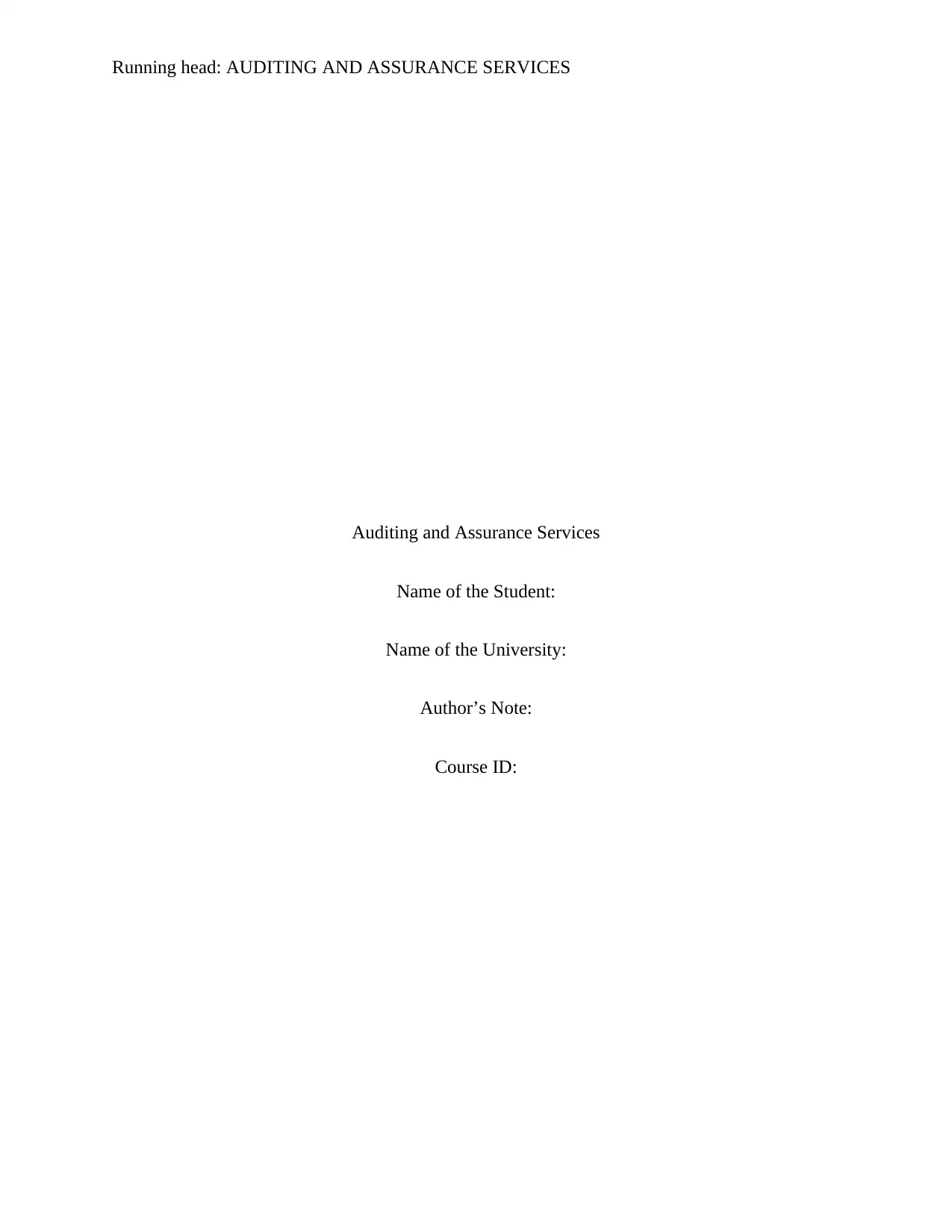
Running head: AUDITING AND ASSURANCE SERVICES
Auditing and Assurance Services
Name of the Student:
Name of the University:
Author’s Note:
Course ID:
Auditing and Assurance Services
Name of the Student:
Name of the University:
Author’s Note:
Course ID:
Paraphrase This Document
Need a fresh take? Get an instant paraphrase of this document with our AI Paraphraser
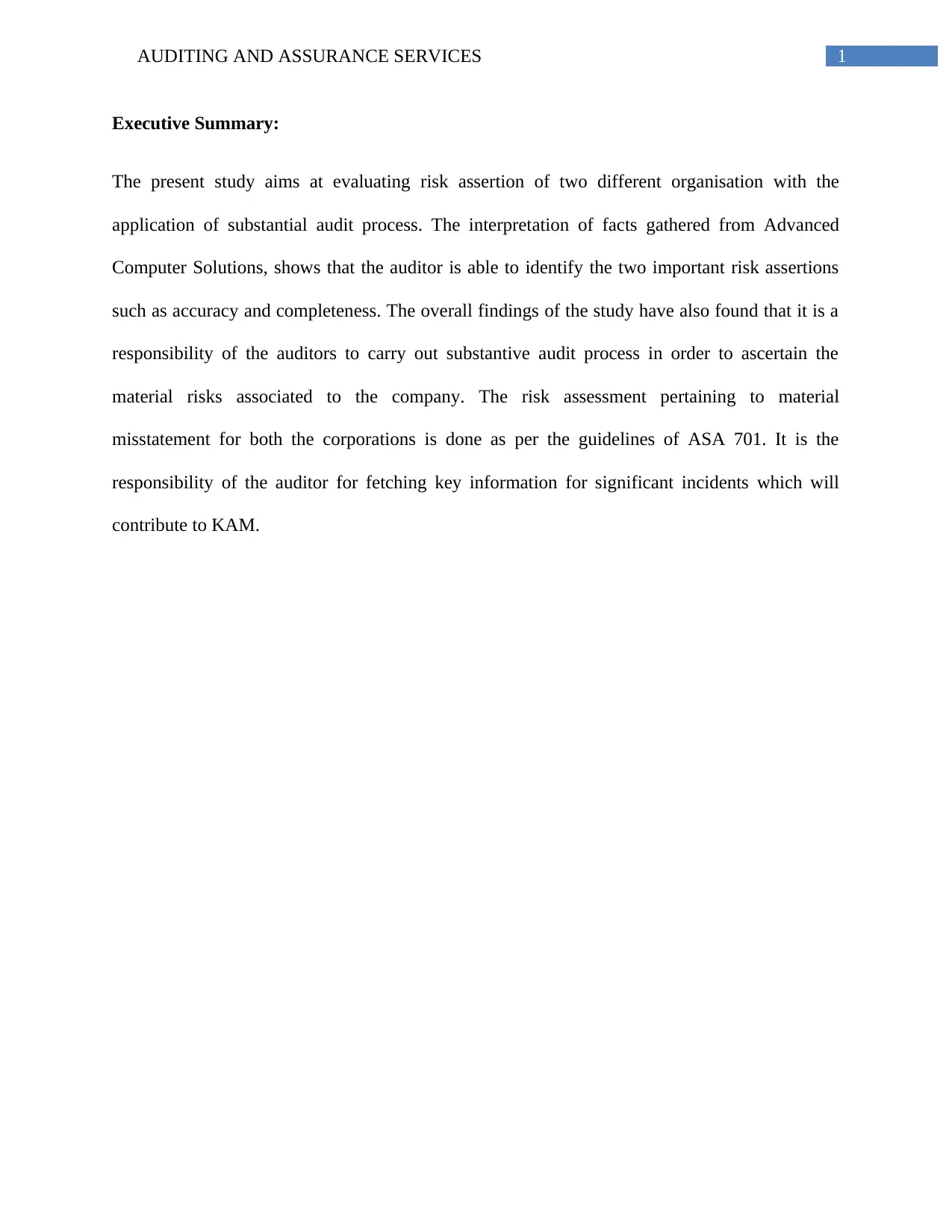
1AUDITING AND ASSURANCE SERVICES
Executive Summary:
The present study aims at evaluating risk assertion of two different organisation with the
application of substantial audit process. The interpretation of facts gathered from Advanced
Computer Solutions, shows that the auditor is able to identify the two important risk assertions
such as accuracy and completeness. The overall findings of the study have also found that it is a
responsibility of the auditors to carry out substantive audit process in order to ascertain the
material risks associated to the company. The risk assessment pertaining to material
misstatement for both the corporations is done as per the guidelines of ASA 701. It is the
responsibility of the auditor for fetching key information for significant incidents which will
contribute to KAM.
Executive Summary:
The present study aims at evaluating risk assertion of two different organisation with the
application of substantial audit process. The interpretation of facts gathered from Advanced
Computer Solutions, shows that the auditor is able to identify the two important risk assertions
such as accuracy and completeness. The overall findings of the study have also found that it is a
responsibility of the auditors to carry out substantive audit process in order to ascertain the
material risks associated to the company. The risk assessment pertaining to material
misstatement for both the corporations is done as per the guidelines of ASA 701. It is the
responsibility of the auditor for fetching key information for significant incidents which will
contribute to KAM.
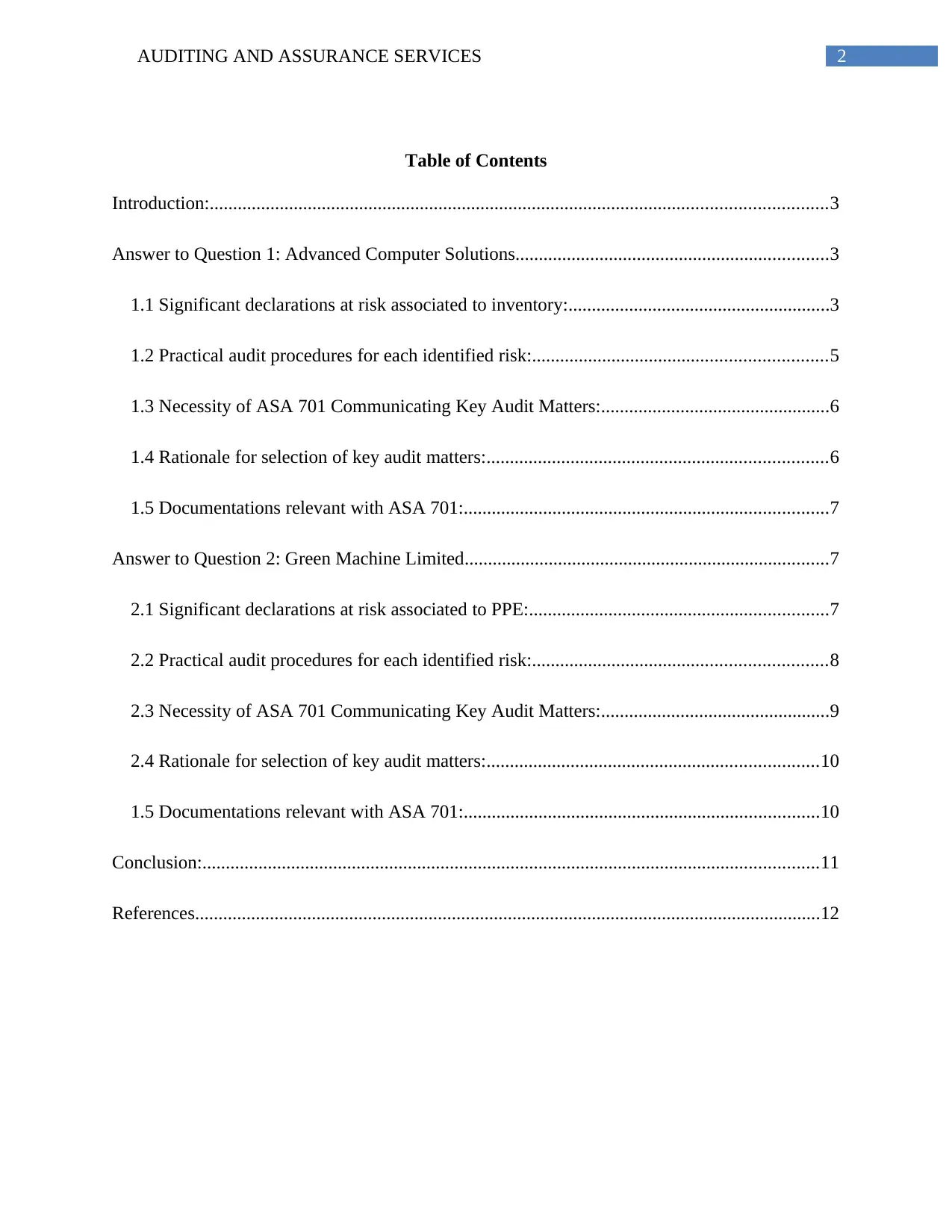
2AUDITING AND ASSURANCE SERVICES
Table of Contents
Introduction:....................................................................................................................................3
Answer to Question 1: Advanced Computer Solutions...................................................................3
1.1 Significant declarations at risk associated to inventory:........................................................3
1.2 Practical audit procedures for each identified risk:...............................................................5
1.3 Necessity of ASA 701 Communicating Key Audit Matters:.................................................6
1.4 Rationale for selection of key audit matters:.........................................................................6
1.5 Documentations relevant with ASA 701:..............................................................................7
Answer to Question 2: Green Machine Limited..............................................................................7
2.1 Significant declarations at risk associated to PPE:................................................................7
2.2 Practical audit procedures for each identified risk:...............................................................8
2.3 Necessity of ASA 701 Communicating Key Audit Matters:.................................................9
2.4 Rationale for selection of key audit matters:.......................................................................10
1.5 Documentations relevant with ASA 701:............................................................................10
Conclusion:....................................................................................................................................11
References......................................................................................................................................12
Table of Contents
Introduction:....................................................................................................................................3
Answer to Question 1: Advanced Computer Solutions...................................................................3
1.1 Significant declarations at risk associated to inventory:........................................................3
1.2 Practical audit procedures for each identified risk:...............................................................5
1.3 Necessity of ASA 701 Communicating Key Audit Matters:.................................................6
1.4 Rationale for selection of key audit matters:.........................................................................6
1.5 Documentations relevant with ASA 701:..............................................................................7
Answer to Question 2: Green Machine Limited..............................................................................7
2.1 Significant declarations at risk associated to PPE:................................................................7
2.2 Practical audit procedures for each identified risk:...............................................................8
2.3 Necessity of ASA 701 Communicating Key Audit Matters:.................................................9
2.4 Rationale for selection of key audit matters:.......................................................................10
1.5 Documentations relevant with ASA 701:............................................................................10
Conclusion:....................................................................................................................................11
References......................................................................................................................................12
⊘ This is a preview!⊘
Do you want full access?
Subscribe today to unlock all pages.

Trusted by 1+ million students worldwide
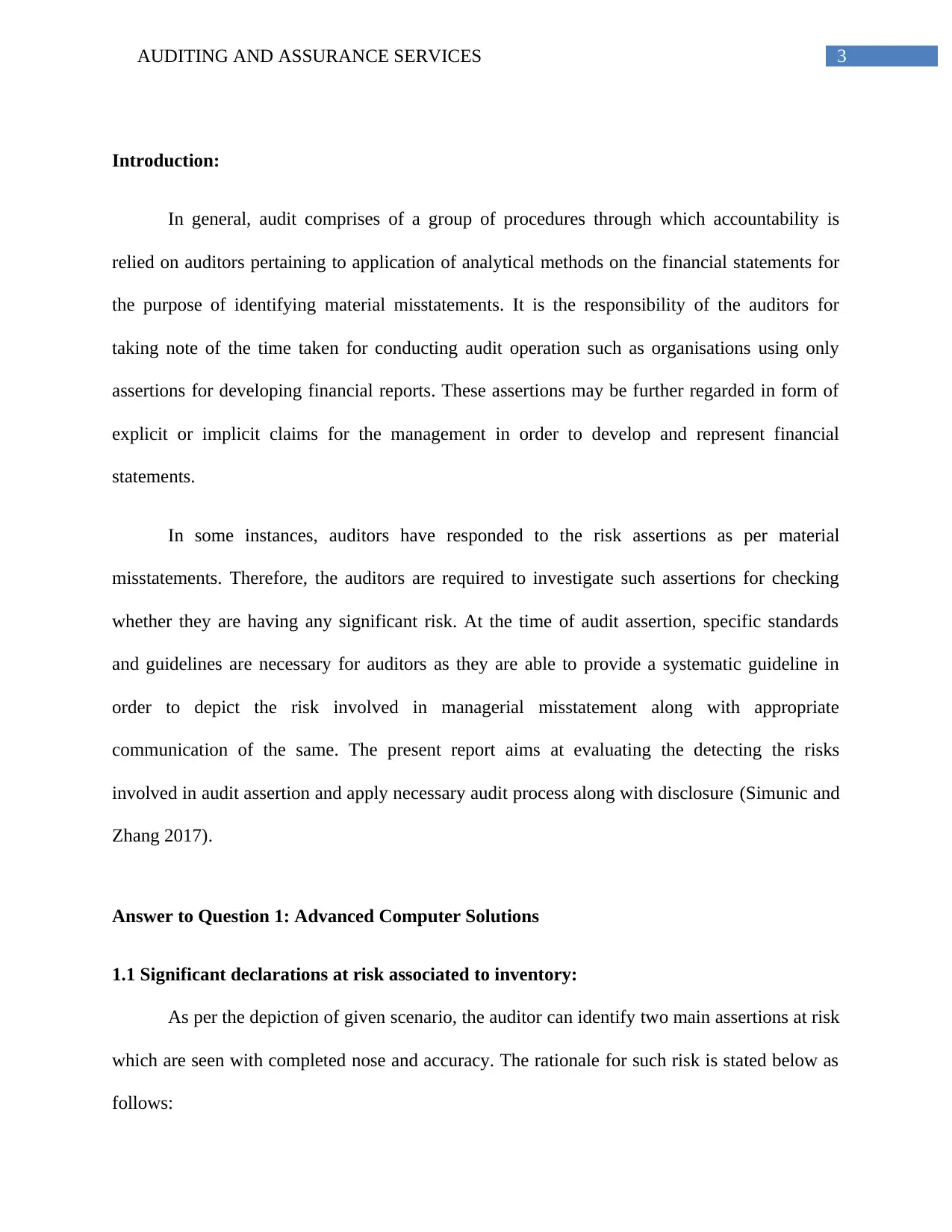
3AUDITING AND ASSURANCE SERVICES
Introduction:
In general, audit comprises of a group of procedures through which accountability is
relied on auditors pertaining to application of analytical methods on the financial statements for
the purpose of identifying material misstatements. It is the responsibility of the auditors for
taking note of the time taken for conducting audit operation such as organisations using only
assertions for developing financial reports. These assertions may be further regarded in form of
explicit or implicit claims for the management in order to develop and represent financial
statements.
In some instances, auditors have responded to the risk assertions as per material
misstatements. Therefore, the auditors are required to investigate such assertions for checking
whether they are having any significant risk. At the time of audit assertion, specific standards
and guidelines are necessary for auditors as they are able to provide a systematic guideline in
order to depict the risk involved in managerial misstatement along with appropriate
communication of the same. The present report aims at evaluating the detecting the risks
involved in audit assertion and apply necessary audit process along with disclosure (Simunic and
Zhang 2017).
Answer to Question 1: Advanced Computer Solutions
1.1 Significant declarations at risk associated to inventory:
As per the depiction of given scenario, the auditor can identify two main assertions at risk
which are seen with completed nose and accuracy. The rationale for such risk is stated below as
follows:
Introduction:
In general, audit comprises of a group of procedures through which accountability is
relied on auditors pertaining to application of analytical methods on the financial statements for
the purpose of identifying material misstatements. It is the responsibility of the auditors for
taking note of the time taken for conducting audit operation such as organisations using only
assertions for developing financial reports. These assertions may be further regarded in form of
explicit or implicit claims for the management in order to develop and represent financial
statements.
In some instances, auditors have responded to the risk assertions as per material
misstatements. Therefore, the auditors are required to investigate such assertions for checking
whether they are having any significant risk. At the time of audit assertion, specific standards
and guidelines are necessary for auditors as they are able to provide a systematic guideline in
order to depict the risk involved in managerial misstatement along with appropriate
communication of the same. The present report aims at evaluating the detecting the risks
involved in audit assertion and apply necessary audit process along with disclosure (Simunic and
Zhang 2017).
Answer to Question 1: Advanced Computer Solutions
1.1 Significant declarations at risk associated to inventory:
As per the depiction of given scenario, the auditor can identify two main assertions at risk
which are seen with completed nose and accuracy. The rationale for such risk is stated below as
follows:
Paraphrase This Document
Need a fresh take? Get an instant paraphrase of this document with our AI Paraphraser
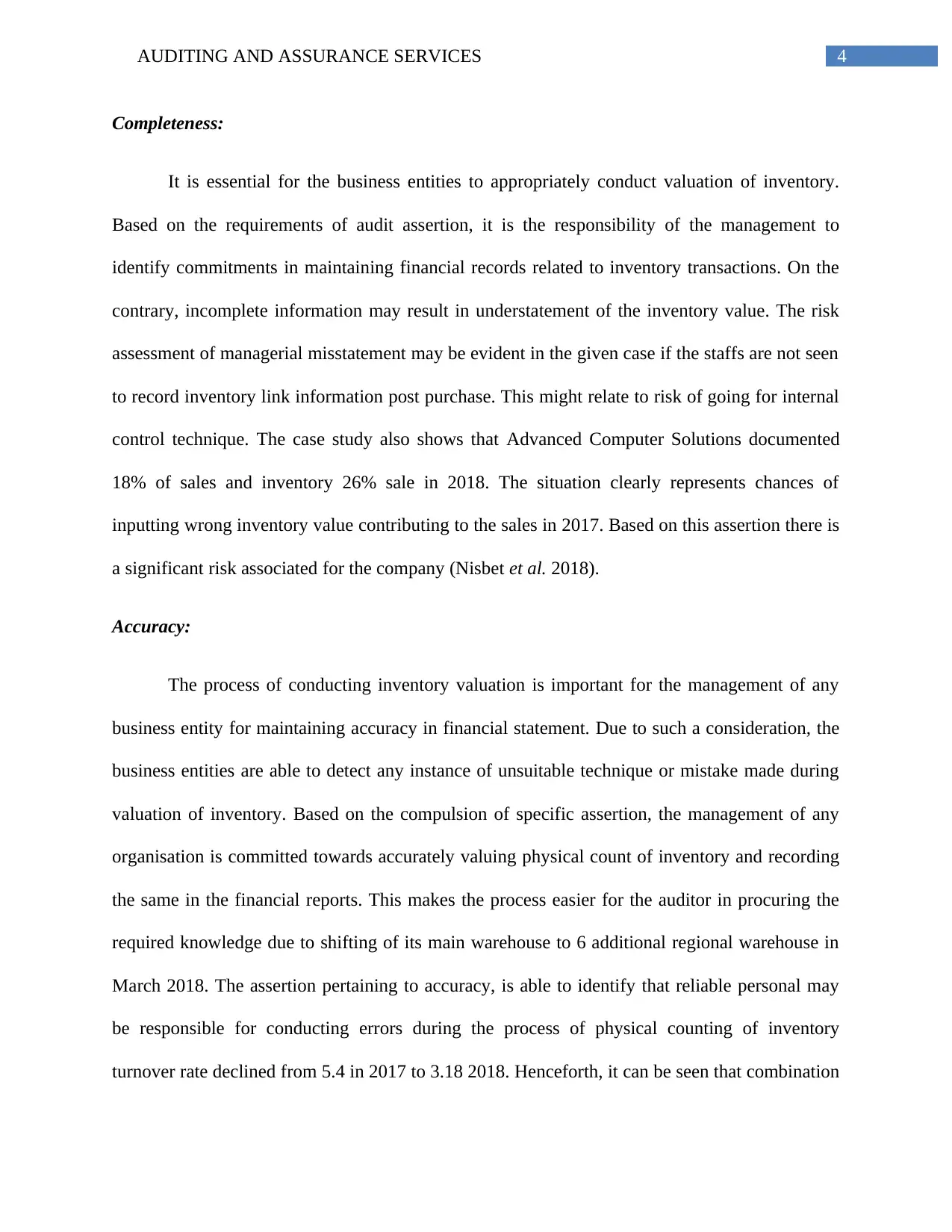
4AUDITING AND ASSURANCE SERVICES
Completeness:
It is essential for the business entities to appropriately conduct valuation of inventory.
Based on the requirements of audit assertion, it is the responsibility of the management to
identify commitments in maintaining financial records related to inventory transactions. On the
contrary, incomplete information may result in understatement of the inventory value. The risk
assessment of managerial misstatement may be evident in the given case if the staffs are not seen
to record inventory link information post purchase. This might relate to risk of going for internal
control technique. The case study also shows that Advanced Computer Solutions documented
18% of sales and inventory 26% sale in 2018. The situation clearly represents chances of
inputting wrong inventory value contributing to the sales in 2017. Based on this assertion there is
a significant risk associated for the company (Nisbet et al. 2018).
Accuracy:
The process of conducting inventory valuation is important for the management of any
business entity for maintaining accuracy in financial statement. Due to such a consideration, the
business entities are able to detect any instance of unsuitable technique or mistake made during
valuation of inventory. Based on the compulsion of specific assertion, the management of any
organisation is committed towards accurately valuing physical count of inventory and recording
the same in the financial reports. This makes the process easier for the auditor in procuring the
required knowledge due to shifting of its main warehouse to 6 additional regional warehouse in
March 2018. The assertion pertaining to accuracy, is able to identify that reliable personal may
be responsible for conducting errors during the process of physical counting of inventory
turnover rate declined from 5.4 in 2017 to 3.18 2018. Henceforth, it can be seen that combination
Completeness:
It is essential for the business entities to appropriately conduct valuation of inventory.
Based on the requirements of audit assertion, it is the responsibility of the management to
identify commitments in maintaining financial records related to inventory transactions. On the
contrary, incomplete information may result in understatement of the inventory value. The risk
assessment of managerial misstatement may be evident in the given case if the staffs are not seen
to record inventory link information post purchase. This might relate to risk of going for internal
control technique. The case study also shows that Advanced Computer Solutions documented
18% of sales and inventory 26% sale in 2018. The situation clearly represents chances of
inputting wrong inventory value contributing to the sales in 2017. Based on this assertion there is
a significant risk associated for the company (Nisbet et al. 2018).
Accuracy:
The process of conducting inventory valuation is important for the management of any
business entity for maintaining accuracy in financial statement. Due to such a consideration, the
business entities are able to detect any instance of unsuitable technique or mistake made during
valuation of inventory. Based on the compulsion of specific assertion, the management of any
organisation is committed towards accurately valuing physical count of inventory and recording
the same in the financial reports. This makes the process easier for the auditor in procuring the
required knowledge due to shifting of its main warehouse to 6 additional regional warehouse in
March 2018. The assertion pertaining to accuracy, is able to identify that reliable personal may
be responsible for conducting errors during the process of physical counting of inventory
turnover rate declined from 5.4 in 2017 to 3.18 2018. Henceforth, it can be seen that combination
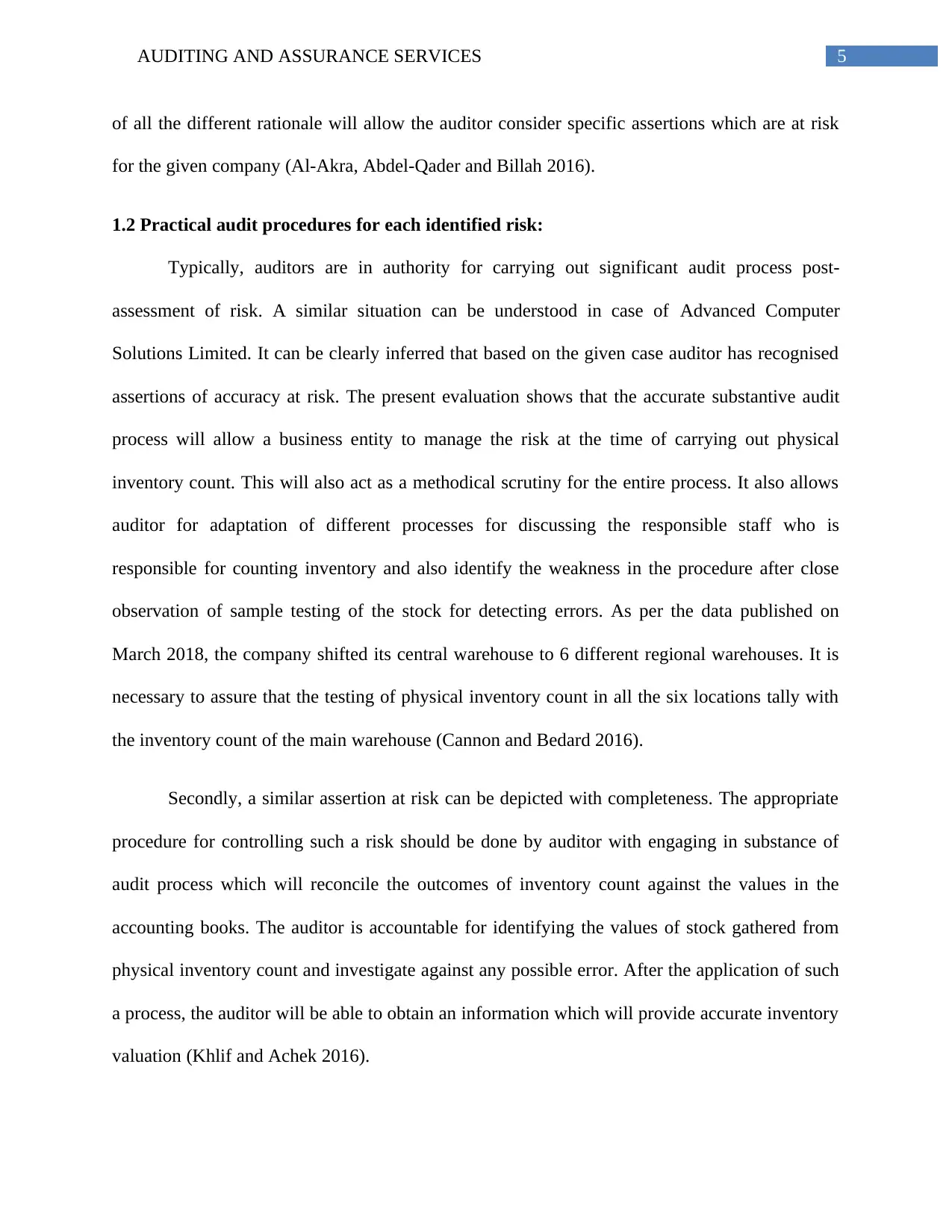
5AUDITING AND ASSURANCE SERVICES
of all the different rationale will allow the auditor consider specific assertions which are at risk
for the given company (Al-Akra, Abdel-Qader and Billah 2016).
1.2 Practical audit procedures for each identified risk:
Typically, auditors are in authority for carrying out significant audit process post-
assessment of risk. A similar situation can be understood in case of Advanced Computer
Solutions Limited. It can be clearly inferred that based on the given case auditor has recognised
assertions of accuracy at risk. The present evaluation shows that the accurate substantive audit
process will allow a business entity to manage the risk at the time of carrying out physical
inventory count. This will also act as a methodical scrutiny for the entire process. It also allows
auditor for adaptation of different processes for discussing the responsible staff who is
responsible for counting inventory and also identify the weakness in the procedure after close
observation of sample testing of the stock for detecting errors. As per the data published on
March 2018, the company shifted its central warehouse to 6 different regional warehouses. It is
necessary to assure that the testing of physical inventory count in all the six locations tally with
the inventory count of the main warehouse (Cannon and Bedard 2016).
Secondly, a similar assertion at risk can be depicted with completeness. The appropriate
procedure for controlling such a risk should be done by auditor with engaging in substance of
audit process which will reconcile the outcomes of inventory count against the values in the
accounting books. The auditor is accountable for identifying the values of stock gathered from
physical inventory count and investigate against any possible error. After the application of such
a process, the auditor will be able to obtain an information which will provide accurate inventory
valuation (Khlif and Achek 2016).
of all the different rationale will allow the auditor consider specific assertions which are at risk
for the given company (Al-Akra, Abdel-Qader and Billah 2016).
1.2 Practical audit procedures for each identified risk:
Typically, auditors are in authority for carrying out significant audit process post-
assessment of risk. A similar situation can be understood in case of Advanced Computer
Solutions Limited. It can be clearly inferred that based on the given case auditor has recognised
assertions of accuracy at risk. The present evaluation shows that the accurate substantive audit
process will allow a business entity to manage the risk at the time of carrying out physical
inventory count. This will also act as a methodical scrutiny for the entire process. It also allows
auditor for adaptation of different processes for discussing the responsible staff who is
responsible for counting inventory and also identify the weakness in the procedure after close
observation of sample testing of the stock for detecting errors. As per the data published on
March 2018, the company shifted its central warehouse to 6 different regional warehouses. It is
necessary to assure that the testing of physical inventory count in all the six locations tally with
the inventory count of the main warehouse (Cannon and Bedard 2016).
Secondly, a similar assertion at risk can be depicted with completeness. The appropriate
procedure for controlling such a risk should be done by auditor with engaging in substance of
audit process which will reconcile the outcomes of inventory count against the values in the
accounting books. The auditor is accountable for identifying the values of stock gathered from
physical inventory count and investigate against any possible error. After the application of such
a process, the auditor will be able to obtain an information which will provide accurate inventory
valuation (Khlif and Achek 2016).
⊘ This is a preview!⊘
Do you want full access?
Subscribe today to unlock all pages.

Trusted by 1+ million students worldwide
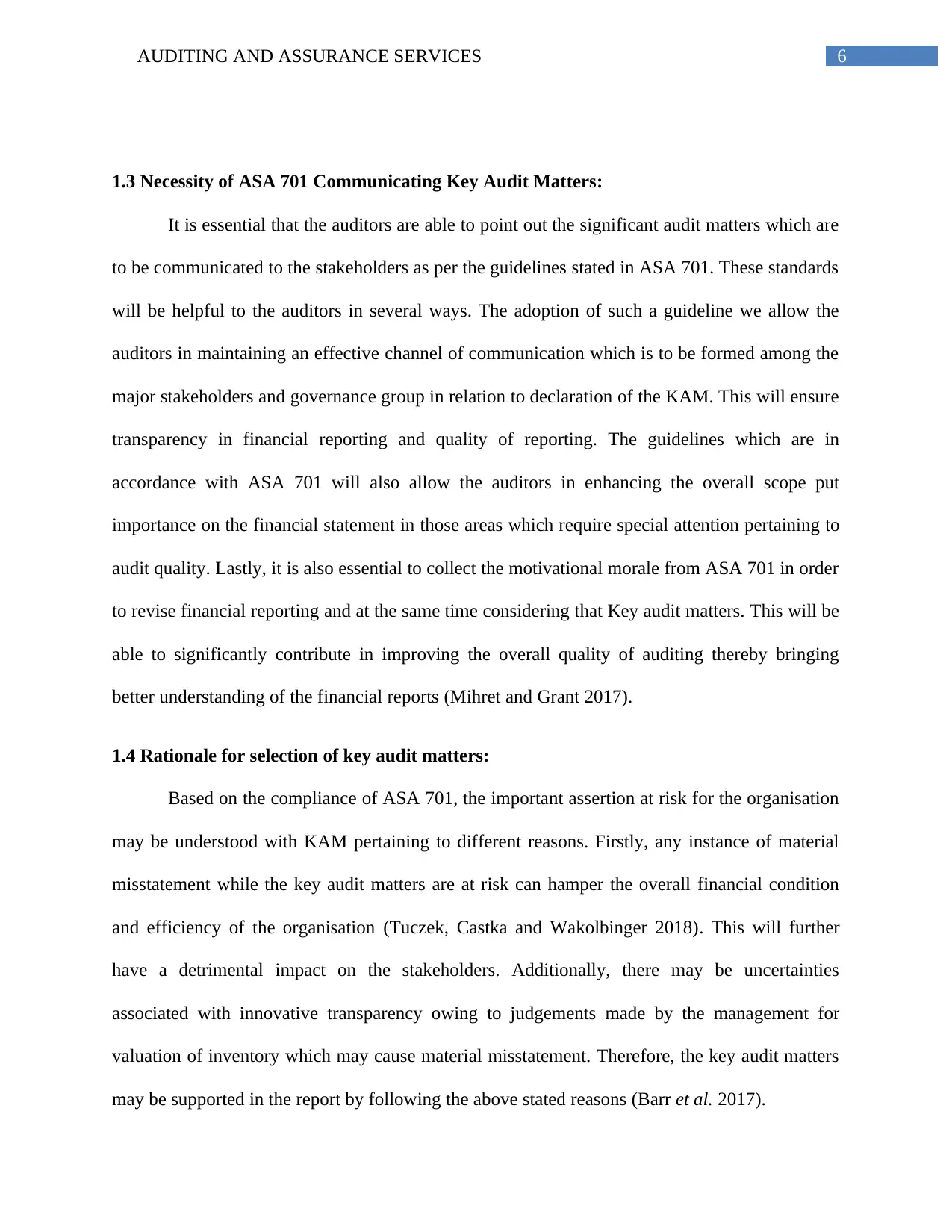
6AUDITING AND ASSURANCE SERVICES
1.3 Necessity of ASA 701 Communicating Key Audit Matters:
It is essential that the auditors are able to point out the significant audit matters which are
to be communicated to the stakeholders as per the guidelines stated in ASA 701. These standards
will be helpful to the auditors in several ways. The adoption of such a guideline we allow the
auditors in maintaining an effective channel of communication which is to be formed among the
major stakeholders and governance group in relation to declaration of the KAM. This will ensure
transparency in financial reporting and quality of reporting. The guidelines which are in
accordance with ASA 701 will also allow the auditors in enhancing the overall scope put
importance on the financial statement in those areas which require special attention pertaining to
audit quality. Lastly, it is also essential to collect the motivational morale from ASA 701 in order
to revise financial reporting and at the same time considering that Key audit matters. This will be
able to significantly contribute in improving the overall quality of auditing thereby bringing
better understanding of the financial reports (Mihret and Grant 2017).
1.4 Rationale for selection of key audit matters:
Based on the compliance of ASA 701, the important assertion at risk for the organisation
may be understood with KAM pertaining to different reasons. Firstly, any instance of material
misstatement while the key audit matters are at risk can hamper the overall financial condition
and efficiency of the organisation (Tuczek, Castka and Wakolbinger 2018). This will further
have a detrimental impact on the stakeholders. Additionally, there may be uncertainties
associated with innovative transparency owing to judgements made by the management for
valuation of inventory which may cause material misstatement. Therefore, the key audit matters
may be supported in the report by following the above stated reasons (Barr et al. 2017).
1.3 Necessity of ASA 701 Communicating Key Audit Matters:
It is essential that the auditors are able to point out the significant audit matters which are
to be communicated to the stakeholders as per the guidelines stated in ASA 701. These standards
will be helpful to the auditors in several ways. The adoption of such a guideline we allow the
auditors in maintaining an effective channel of communication which is to be formed among the
major stakeholders and governance group in relation to declaration of the KAM. This will ensure
transparency in financial reporting and quality of reporting. The guidelines which are in
accordance with ASA 701 will also allow the auditors in enhancing the overall scope put
importance on the financial statement in those areas which require special attention pertaining to
audit quality. Lastly, it is also essential to collect the motivational morale from ASA 701 in order
to revise financial reporting and at the same time considering that Key audit matters. This will be
able to significantly contribute in improving the overall quality of auditing thereby bringing
better understanding of the financial reports (Mihret and Grant 2017).
1.4 Rationale for selection of key audit matters:
Based on the compliance of ASA 701, the important assertion at risk for the organisation
may be understood with KAM pertaining to different reasons. Firstly, any instance of material
misstatement while the key audit matters are at risk can hamper the overall financial condition
and efficiency of the organisation (Tuczek, Castka and Wakolbinger 2018). This will further
have a detrimental impact on the stakeholders. Additionally, there may be uncertainties
associated with innovative transparency owing to judgements made by the management for
valuation of inventory which may cause material misstatement. Therefore, the key audit matters
may be supported in the report by following the above stated reasons (Barr et al. 2017).
Paraphrase This Document
Need a fresh take? Get an instant paraphrase of this document with our AI Paraphraser
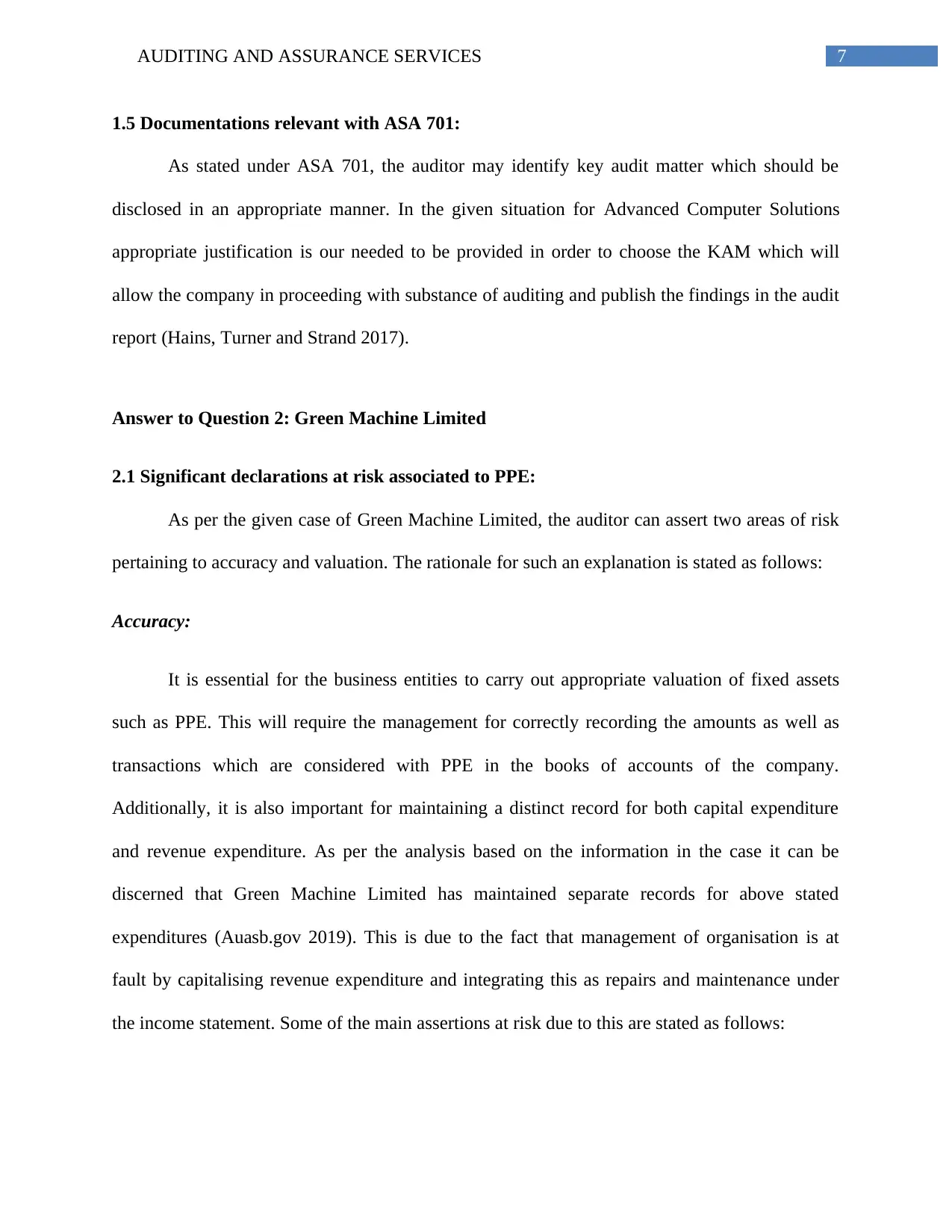
7AUDITING AND ASSURANCE SERVICES
1.5 Documentations relevant with ASA 701:
As stated under ASA 701, the auditor may identify key audit matter which should be
disclosed in an appropriate manner. In the given situation for Advanced Computer Solutions
appropriate justification is our needed to be provided in order to choose the KAM which will
allow the company in proceeding with substance of auditing and publish the findings in the audit
report (Hains, Turner and Strand 2017).
Answer to Question 2: Green Machine Limited
2.1 Significant declarations at risk associated to PPE:
As per the given case of Green Machine Limited, the auditor can assert two areas of risk
pertaining to accuracy and valuation. The rationale for such an explanation is stated as follows:
Accuracy:
It is essential for the business entities to carry out appropriate valuation of fixed assets
such as PPE. This will require the management for correctly recording the amounts as well as
transactions which are considered with PPE in the books of accounts of the company.
Additionally, it is also important for maintaining a distinct record for both capital expenditure
and revenue expenditure. As per the analysis based on the information in the case it can be
discerned that Green Machine Limited has maintained separate records for above stated
expenditures (Auasb.gov 2019). This is due to the fact that management of organisation is at
fault by capitalising revenue expenditure and integrating this as repairs and maintenance under
the income statement. Some of the main assertions at risk due to this are stated as follows:
1.5 Documentations relevant with ASA 701:
As stated under ASA 701, the auditor may identify key audit matter which should be
disclosed in an appropriate manner. In the given situation for Advanced Computer Solutions
appropriate justification is our needed to be provided in order to choose the KAM which will
allow the company in proceeding with substance of auditing and publish the findings in the audit
report (Hains, Turner and Strand 2017).
Answer to Question 2: Green Machine Limited
2.1 Significant declarations at risk associated to PPE:
As per the given case of Green Machine Limited, the auditor can assert two areas of risk
pertaining to accuracy and valuation. The rationale for such an explanation is stated as follows:
Accuracy:
It is essential for the business entities to carry out appropriate valuation of fixed assets
such as PPE. This will require the management for correctly recording the amounts as well as
transactions which are considered with PPE in the books of accounts of the company.
Additionally, it is also important for maintaining a distinct record for both capital expenditure
and revenue expenditure. As per the analysis based on the information in the case it can be
discerned that Green Machine Limited has maintained separate records for above stated
expenditures (Auasb.gov 2019). This is due to the fact that management of organisation is at
fault by capitalising revenue expenditure and integrating this as repairs and maintenance under
the income statement. Some of the main assertions at risk due to this are stated as follows:
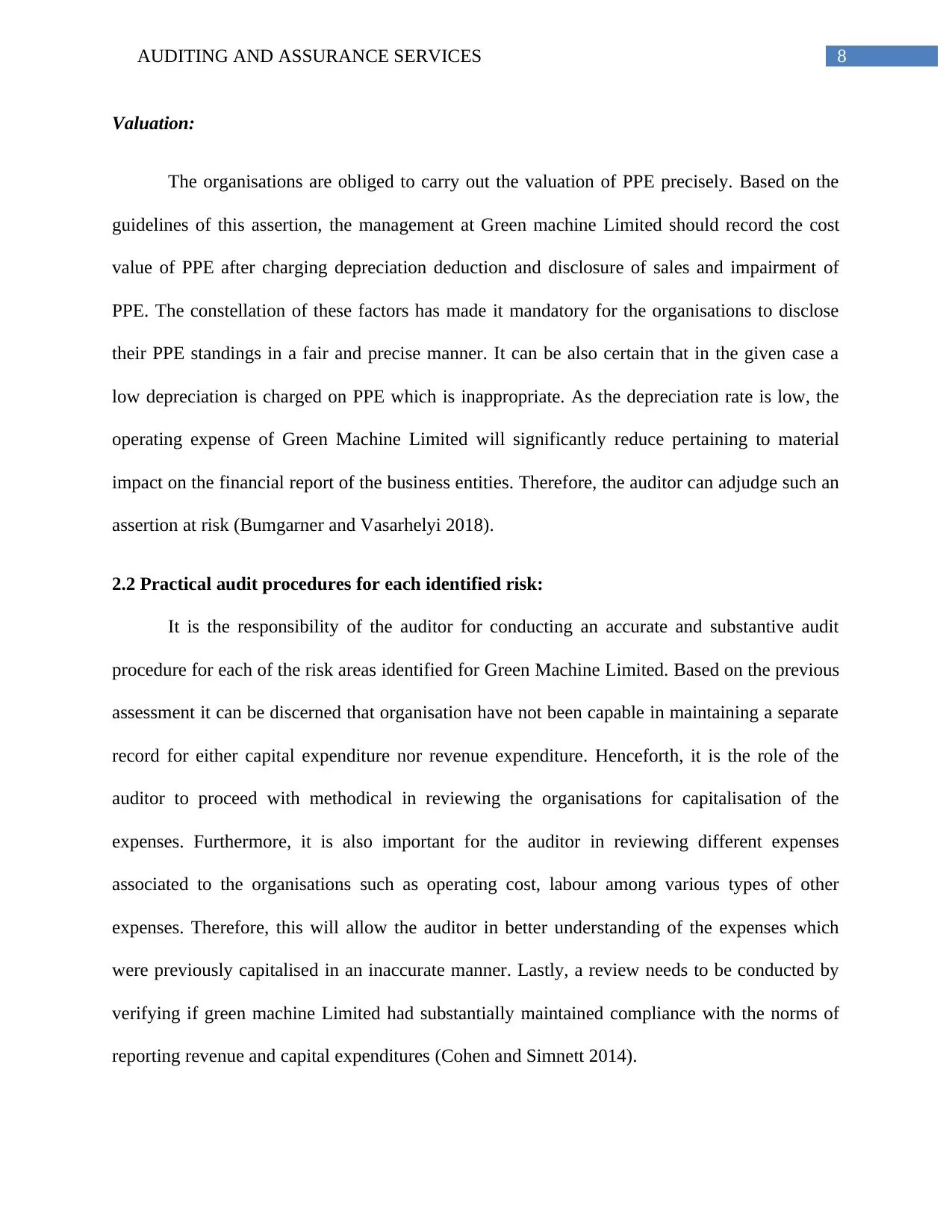
8AUDITING AND ASSURANCE SERVICES
Valuation:
The organisations are obliged to carry out the valuation of PPE precisely. Based on the
guidelines of this assertion, the management at Green machine Limited should record the cost
value of PPE after charging depreciation deduction and disclosure of sales and impairment of
PPE. The constellation of these factors has made it mandatory for the organisations to disclose
their PPE standings in a fair and precise manner. It can be also certain that in the given case a
low depreciation is charged on PPE which is inappropriate. As the depreciation rate is low, the
operating expense of Green Machine Limited will significantly reduce pertaining to material
impact on the financial report of the business entities. Therefore, the auditor can adjudge such an
assertion at risk (Bumgarner and Vasarhelyi 2018).
2.2 Practical audit procedures for each identified risk:
It is the responsibility of the auditor for conducting an accurate and substantive audit
procedure for each of the risk areas identified for Green Machine Limited. Based on the previous
assessment it can be discerned that organisation have not been capable in maintaining a separate
record for either capital expenditure nor revenue expenditure. Henceforth, it is the role of the
auditor to proceed with methodical in reviewing the organisations for capitalisation of the
expenses. Furthermore, it is also important for the auditor in reviewing different expenses
associated to the organisations such as operating cost, labour among various types of other
expenses. Therefore, this will allow the auditor in better understanding of the expenses which
were previously capitalised in an inaccurate manner. Lastly, a review needs to be conducted by
verifying if green machine Limited had substantially maintained compliance with the norms of
reporting revenue and capital expenditures (Cohen and Simnett 2014).
Valuation:
The organisations are obliged to carry out the valuation of PPE precisely. Based on the
guidelines of this assertion, the management at Green machine Limited should record the cost
value of PPE after charging depreciation deduction and disclosure of sales and impairment of
PPE. The constellation of these factors has made it mandatory for the organisations to disclose
their PPE standings in a fair and precise manner. It can be also certain that in the given case a
low depreciation is charged on PPE which is inappropriate. As the depreciation rate is low, the
operating expense of Green Machine Limited will significantly reduce pertaining to material
impact on the financial report of the business entities. Therefore, the auditor can adjudge such an
assertion at risk (Bumgarner and Vasarhelyi 2018).
2.2 Practical audit procedures for each identified risk:
It is the responsibility of the auditor for conducting an accurate and substantive audit
procedure for each of the risk areas identified for Green Machine Limited. Based on the previous
assessment it can be discerned that organisation have not been capable in maintaining a separate
record for either capital expenditure nor revenue expenditure. Henceforth, it is the role of the
auditor to proceed with methodical in reviewing the organisations for capitalisation of the
expenses. Furthermore, it is also important for the auditor in reviewing different expenses
associated to the organisations such as operating cost, labour among various types of other
expenses. Therefore, this will allow the auditor in better understanding of the expenses which
were previously capitalised in an inaccurate manner. Lastly, a review needs to be conducted by
verifying if green machine Limited had substantially maintained compliance with the norms of
reporting revenue and capital expenditures (Cohen and Simnett 2014).
⊘ This is a preview!⊘
Do you want full access?
Subscribe today to unlock all pages.

Trusted by 1+ million students worldwide
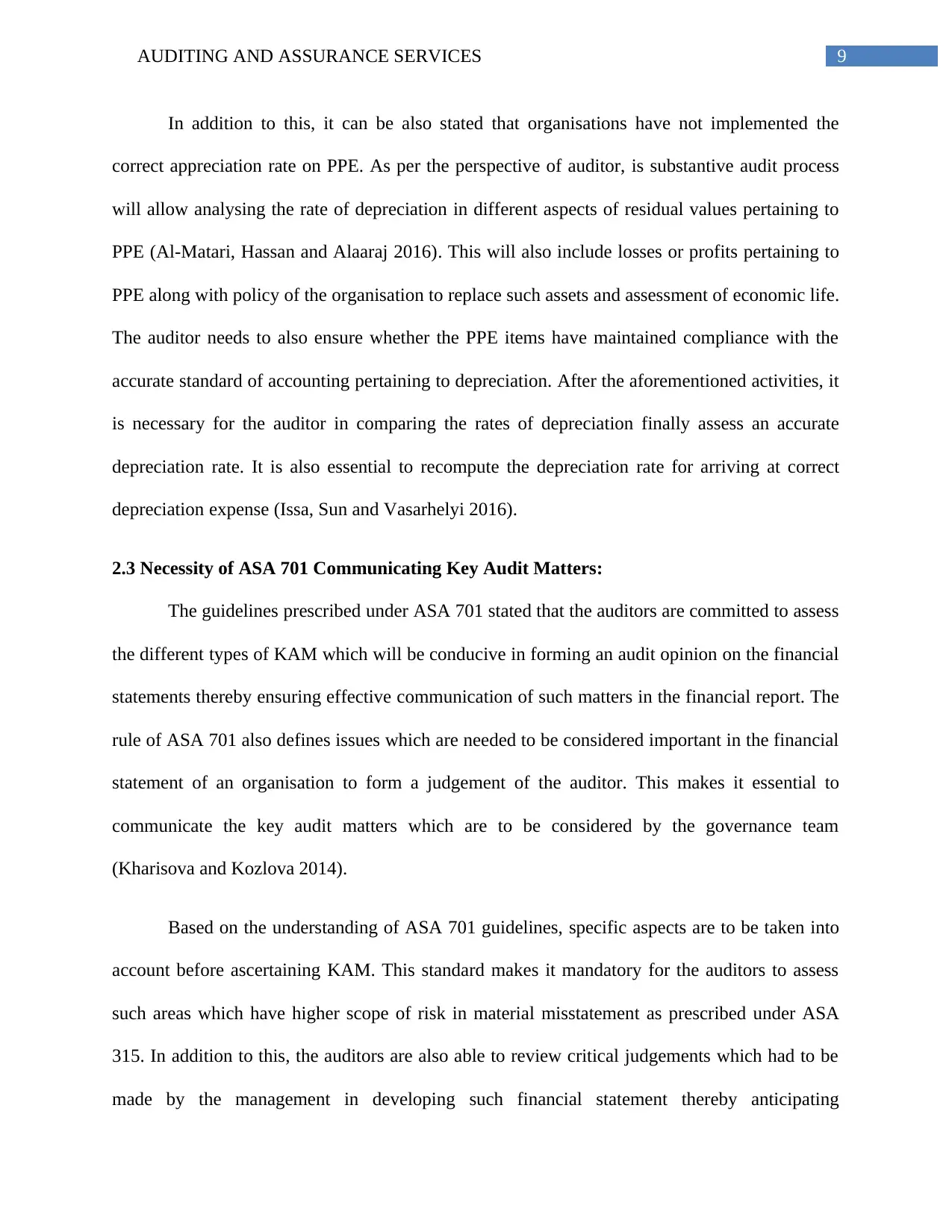
9AUDITING AND ASSURANCE SERVICES
In addition to this, it can be also stated that organisations have not implemented the
correct appreciation rate on PPE. As per the perspective of auditor, is substantive audit process
will allow analysing the rate of depreciation in different aspects of residual values pertaining to
PPE (Al-Matari, Hassan and Alaaraj 2016). This will also include losses or profits pertaining to
PPE along with policy of the organisation to replace such assets and assessment of economic life.
The auditor needs to also ensure whether the PPE items have maintained compliance with the
accurate standard of accounting pertaining to depreciation. After the aforementioned activities, it
is necessary for the auditor in comparing the rates of depreciation finally assess an accurate
depreciation rate. It is also essential to recompute the depreciation rate for arriving at correct
depreciation expense (Issa, Sun and Vasarhelyi 2016).
2.3 Necessity of ASA 701 Communicating Key Audit Matters:
The guidelines prescribed under ASA 701 stated that the auditors are committed to assess
the different types of KAM which will be conducive in forming an audit opinion on the financial
statements thereby ensuring effective communication of such matters in the financial report. The
rule of ASA 701 also defines issues which are needed to be considered important in the financial
statement of an organisation to form a judgement of the auditor. This makes it essential to
communicate the key audit matters which are to be considered by the governance team
(Kharisova and Kozlova 2014).
Based on the understanding of ASA 701 guidelines, specific aspects are to be taken into
account before ascertaining KAM. This standard makes it mandatory for the auditors to assess
such areas which have higher scope of risk in material misstatement as prescribed under ASA
315. In addition to this, the auditors are also able to review critical judgements which had to be
made by the management in developing such financial statement thereby anticipating
In addition to this, it can be also stated that organisations have not implemented the
correct appreciation rate on PPE. As per the perspective of auditor, is substantive audit process
will allow analysing the rate of depreciation in different aspects of residual values pertaining to
PPE (Al-Matari, Hassan and Alaaraj 2016). This will also include losses or profits pertaining to
PPE along with policy of the organisation to replace such assets and assessment of economic life.
The auditor needs to also ensure whether the PPE items have maintained compliance with the
accurate standard of accounting pertaining to depreciation. After the aforementioned activities, it
is necessary for the auditor in comparing the rates of depreciation finally assess an accurate
depreciation rate. It is also essential to recompute the depreciation rate for arriving at correct
depreciation expense (Issa, Sun and Vasarhelyi 2016).
2.3 Necessity of ASA 701 Communicating Key Audit Matters:
The guidelines prescribed under ASA 701 stated that the auditors are committed to assess
the different types of KAM which will be conducive in forming an audit opinion on the financial
statements thereby ensuring effective communication of such matters in the financial report. The
rule of ASA 701 also defines issues which are needed to be considered important in the financial
statement of an organisation to form a judgement of the auditor. This makes it essential to
communicate the key audit matters which are to be considered by the governance team
(Kharisova and Kozlova 2014).
Based on the understanding of ASA 701 guidelines, specific aspects are to be taken into
account before ascertaining KAM. This standard makes it mandatory for the auditors to assess
such areas which have higher scope of risk in material misstatement as prescribed under ASA
315. In addition to this, the auditors are also able to review critical judgements which had to be
made by the management in developing such financial statement thereby anticipating
Paraphrase This Document
Need a fresh take? Get an instant paraphrase of this document with our AI Paraphraser
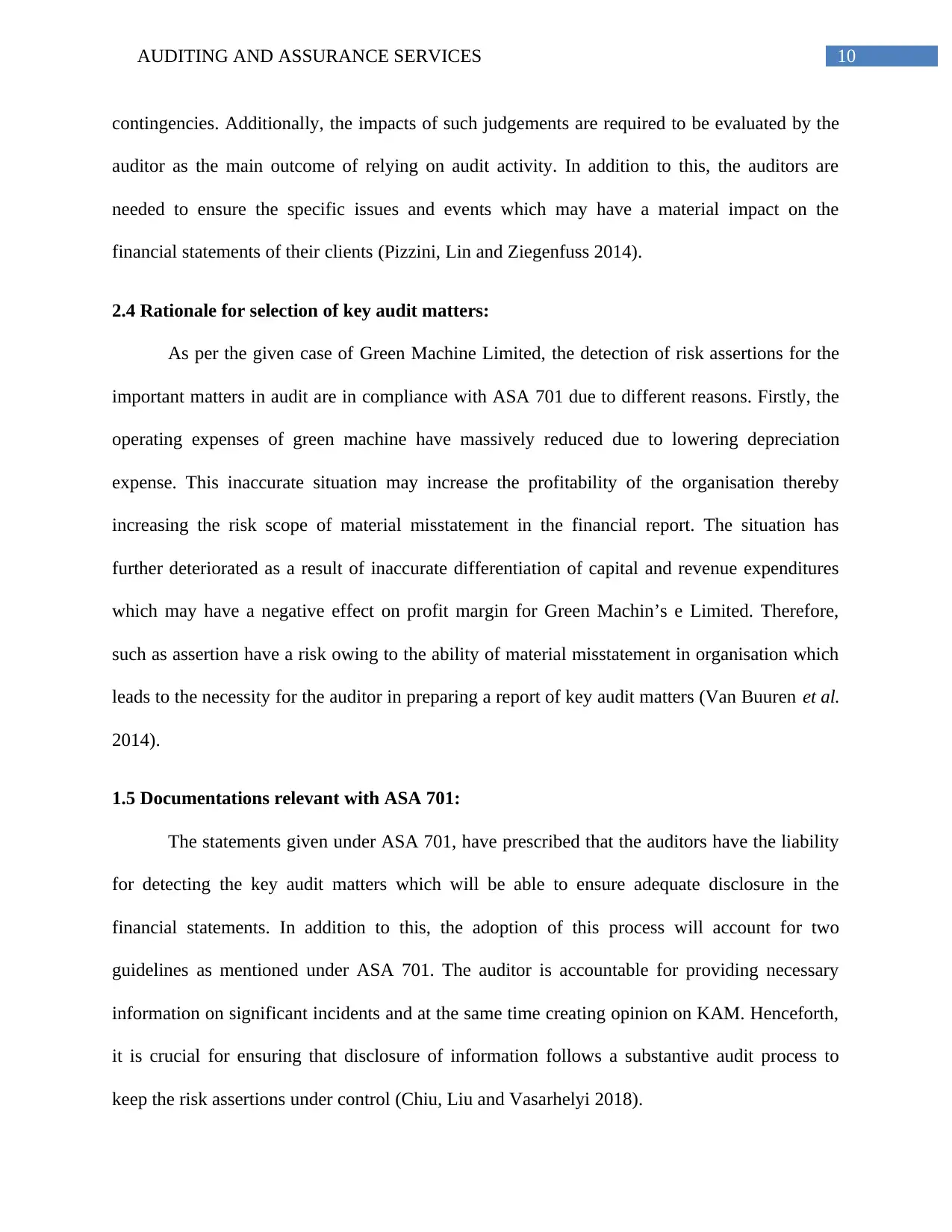
10AUDITING AND ASSURANCE SERVICES
contingencies. Additionally, the impacts of such judgements are required to be evaluated by the
auditor as the main outcome of relying on audit activity. In addition to this, the auditors are
needed to ensure the specific issues and events which may have a material impact on the
financial statements of their clients (Pizzini, Lin and Ziegenfuss 2014).
2.4 Rationale for selection of key audit matters:
As per the given case of Green Machine Limited, the detection of risk assertions for the
important matters in audit are in compliance with ASA 701 due to different reasons. Firstly, the
operating expenses of green machine have massively reduced due to lowering depreciation
expense. This inaccurate situation may increase the profitability of the organisation thereby
increasing the risk scope of material misstatement in the financial report. The situation has
further deteriorated as a result of inaccurate differentiation of capital and revenue expenditures
which may have a negative effect on profit margin for Green Machin’s e Limited. Therefore,
such as assertion have a risk owing to the ability of material misstatement in organisation which
leads to the necessity for the auditor in preparing a report of key audit matters (Van Buuren et al.
2014).
1.5 Documentations relevant with ASA 701:
The statements given under ASA 701, have prescribed that the auditors have the liability
for detecting the key audit matters which will be able to ensure adequate disclosure in the
financial statements. In addition to this, the adoption of this process will account for two
guidelines as mentioned under ASA 701. The auditor is accountable for providing necessary
information on significant incidents and at the same time creating opinion on KAM. Henceforth,
it is crucial for ensuring that disclosure of information follows a substantive audit process to
keep the risk assertions under control (Chiu, Liu and Vasarhelyi 2018).
contingencies. Additionally, the impacts of such judgements are required to be evaluated by the
auditor as the main outcome of relying on audit activity. In addition to this, the auditors are
needed to ensure the specific issues and events which may have a material impact on the
financial statements of their clients (Pizzini, Lin and Ziegenfuss 2014).
2.4 Rationale for selection of key audit matters:
As per the given case of Green Machine Limited, the detection of risk assertions for the
important matters in audit are in compliance with ASA 701 due to different reasons. Firstly, the
operating expenses of green machine have massively reduced due to lowering depreciation
expense. This inaccurate situation may increase the profitability of the organisation thereby
increasing the risk scope of material misstatement in the financial report. The situation has
further deteriorated as a result of inaccurate differentiation of capital and revenue expenditures
which may have a negative effect on profit margin for Green Machin’s e Limited. Therefore,
such as assertion have a risk owing to the ability of material misstatement in organisation which
leads to the necessity for the auditor in preparing a report of key audit matters (Van Buuren et al.
2014).
1.5 Documentations relevant with ASA 701:
The statements given under ASA 701, have prescribed that the auditors have the liability
for detecting the key audit matters which will be able to ensure adequate disclosure in the
financial statements. In addition to this, the adoption of this process will account for two
guidelines as mentioned under ASA 701. The auditor is accountable for providing necessary
information on significant incidents and at the same time creating opinion on KAM. Henceforth,
it is crucial for ensuring that disclosure of information follows a substantive audit process to
keep the risk assertions under control (Chiu, Liu and Vasarhelyi 2018).
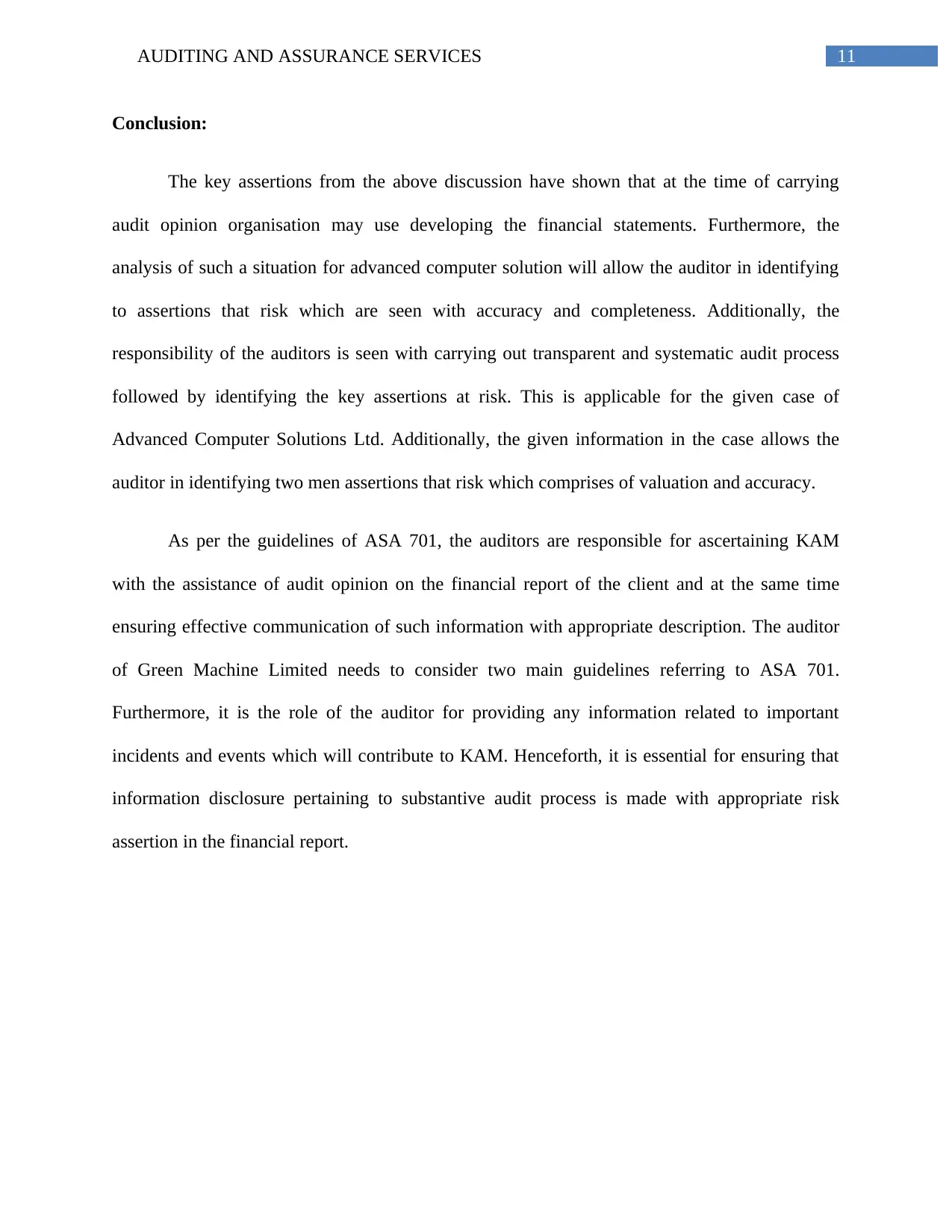
11AUDITING AND ASSURANCE SERVICES
Conclusion:
The key assertions from the above discussion have shown that at the time of carrying
audit opinion organisation may use developing the financial statements. Furthermore, the
analysis of such a situation for advanced computer solution will allow the auditor in identifying
to assertions that risk which are seen with accuracy and completeness. Additionally, the
responsibility of the auditors is seen with carrying out transparent and systematic audit process
followed by identifying the key assertions at risk. This is applicable for the given case of
Advanced Computer Solutions Ltd. Additionally, the given information in the case allows the
auditor in identifying two men assertions that risk which comprises of valuation and accuracy.
As per the guidelines of ASA 701, the auditors are responsible for ascertaining KAM
with the assistance of audit opinion on the financial report of the client and at the same time
ensuring effective communication of such information with appropriate description. The auditor
of Green Machine Limited needs to consider two main guidelines referring to ASA 701.
Furthermore, it is the role of the auditor for providing any information related to important
incidents and events which will contribute to KAM. Henceforth, it is essential for ensuring that
information disclosure pertaining to substantive audit process is made with appropriate risk
assertion in the financial report.
Conclusion:
The key assertions from the above discussion have shown that at the time of carrying
audit opinion organisation may use developing the financial statements. Furthermore, the
analysis of such a situation for advanced computer solution will allow the auditor in identifying
to assertions that risk which are seen with accuracy and completeness. Additionally, the
responsibility of the auditors is seen with carrying out transparent and systematic audit process
followed by identifying the key assertions at risk. This is applicable for the given case of
Advanced Computer Solutions Ltd. Additionally, the given information in the case allows the
auditor in identifying two men assertions that risk which comprises of valuation and accuracy.
As per the guidelines of ASA 701, the auditors are responsible for ascertaining KAM
with the assistance of audit opinion on the financial report of the client and at the same time
ensuring effective communication of such information with appropriate description. The auditor
of Green Machine Limited needs to consider two main guidelines referring to ASA 701.
Furthermore, it is the role of the auditor for providing any information related to important
incidents and events which will contribute to KAM. Henceforth, it is essential for ensuring that
information disclosure pertaining to substantive audit process is made with appropriate risk
assertion in the financial report.
⊘ This is a preview!⊘
Do you want full access?
Subscribe today to unlock all pages.

Trusted by 1+ million students worldwide
1 out of 15
Related Documents
Your All-in-One AI-Powered Toolkit for Academic Success.
+13062052269
info@desklib.com
Available 24*7 on WhatsApp / Email
![[object Object]](/_next/static/media/star-bottom.7253800d.svg)
Unlock your academic potential
Copyright © 2020–2025 A2Z Services. All Rights Reserved. Developed and managed by ZUCOL.





